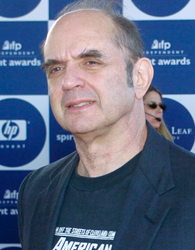Harvey Pekar has made a career out of being an ordinary man. As a comic book writer, he documented the most mundane details of his life. When a Hollywood movie told his story, he continued to work as a file clerk.
Harvey Pekar’s Early Days
Early childhood wasn’t easy for Harvey Pekar, who was born October 8, 1939, in Cleveland, Ohio to Jewish immigrant parents from Poland. He says that as a minority in his primarily African-American neighborhood, he was frequently taunted and beaten up by his peers.
As a result, he developed a tough-guy persona and, when he moved to an all-white neighborhood, became a bully himself. “I bought into this idea that the toughest kid was the most respected kid,” Pekar told Terry Gross in 2005 on the NPR program “Fresh Air.”
When he wasn’t engaged in street fighting, Pekar had his nose buried in comic books. During difficult times, he found escape though the fictional antics of superheroes and villains.
After graduating from high school, Pekar tried out a series of jobs, including work as a postal clerk and some time in the Navy. He was released from the Navy because he didn’t have the flexibility needed for military service. After a few more odd jobs, Pekar accepted a position as a file clerk at a Cleveland Veterans Administration Hospital, where he would stay for the next 37 years.
Sources in this Story
- NPR Fresh Air: The Childhood of Harvey Pekar, ‘The Quitter’
- Random House: About Harvey Pekar
- Vulture: A New Comic by Harvey Pekar and Rick Veitch
- WKSU: Harvey Pekar: Getting Old
- In These Times: The Big Shill
- YouTube: Harvey Pekar on Letterman
- New York Times: Harvey Pekar, ‘American Splendor’ Creator, Dies at 70
Pekar’s Notable Accomplishments
In 1972, famous comic book illustrator R. Crumb encouraged Pekar to begin penning stories for comic books. Although he didn’t have much writing experience, Pekar took to the medium, describing the events in his day-to-day life. “[I] started writing about my quotidian life because I think everybody’s life is interesting,” Pekar said, explaining his subject matter.
His first comic book, “American Splendor,” was published in 1976. He says he chose the name because he thought it was funny. Every year thereafter, Pekar self-published another issue of “American Splendor.” Over the years, some of the comic book community’s biggest players illustrated Pekar’s droll stories: Frank Stack, Gary Budgett, Joe Sacco, Rick Geary and many others have inked work for “American Splendor.”
Although he was well known among comic book lovers for years, it was the 2003 autobiographical movie “American Splendor” that truly brought him mainstream fame. Pekar was played by Paul Giamatti in the film, which won several awards, including some at the Sundance International Festival and Cannes Film Festival. It was also nominated for the Academy Award for Best Adapted Screenplay.
Pekar continued to write and documented his movie experience, his fight with cancer and the adoption of his teenage daughter along with his other, regular topics.
Harvey Pekar and his Work
- “American Splendor: The Life and Times of Harvey Pekar”
- “The Quitter”
- “Bob and Harv’s Comics”
- “American Splendor” (DVD)
The Rest of the Story
Although his primary careers were working at the hospital and writing comic books, Pekar worked quite a bit in other arenas, as well. He parlayed his love of jazz into writing music reviews, and was published in Jazz Times and Downtimes. He also freelanced for Cleveland’s NPR Affiliate, WKSU, where he won several awards for his essays.
Pekar began appearing on “Late Night with David Letterman” in the late 1980s. Letterman seemed to value Pekar’s eccentric nature and the two would engage in verbal duels, each trying to top the other with absurdities. On August 31, 1988, the pair got into an on-air argument, with Pekar criticizing Letterman’s behavior during a recent writers’ strike and calling Letterman a “shill” for NBC’s parent company GE. The argument was heated and the segment ended early. Several years later, Pekar was invited back to the show for two episodes, with similar results.
Pekar died at his Cleveland home on July 12, 2010, at the age of 70.
This article was originally written by Jennifer Ferris; it was updated October 11, 2017.











